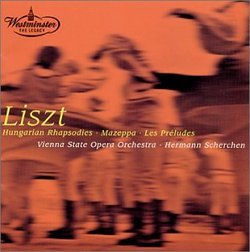Explosively Colorful Performances
T. Beers | Arlington, Virginia United States | 04/15/2002
(5 out of 5 stars)
"These classic (true stereo) recordings of Liszt tone poems and rhapsodies were made in Vienna by Westminster in the late 1950s and are now reissued by Deutsche Grammophon. They sound better than ever in DG's exemplary CD transfers. Hermann Scherchen has come to be remembered chiefly as a champion of twentieth century music, beginning with Mahler; it's good to be reminded how well he conducted the 19th century repertory. Scherchen had a real love for music as dramatic and colorful as this, and ever since their original Lp issue these performances have been recognized as something special. Mostly, Scherchen's achievement is due to his sincere conviction that Liszt's music is better than its reputation. Too often, conductors turn in wishy-washy Liszt performances because they mistrust Liszt's sound and try to refine away the vulgarity. Not Scherchen. Where others heard vulgarity and held their noses, Scherchen (like Bartok) appreciated the elemental vitality of Liszt's music and reveled in its theatricality. You will not hear more dramatic or vibrant Liszt performances than these. So shell out a few bucks, and prepare yourself for an over-the-top, Great Romantic 'Pops' treat. Even "Les Preludes" and the Second Hungarian Rhapsody come up sounding fresh and newly minted!"
Mostly fine, exciting conducting, but sloppy execution
Santa Fe Listener | Santa Fe, NM USA | 10/09/2005
(4 out of 5 stars)
"I can think of three inspiring conductors--Igor Markevitch, Jascha Horenstein, and Scherchen--whose careers were relegeated to second- and third-rate orchestras. All had shots at major orchestras from time to time as guest conductors, and this spilled over into occasional recording dates. But far too often one has to filter out or listen through sloppy, thin, ill-tuned, or even incompetent execution.
In this case Scherchen was more fortunate. Technically, the Vienna State Opera Orchestra is the same as the Vienna Philharmonic--they take this name when they play in the Staatsoper. So it's baffling why the musicians are so spotty here. They sound reasonably involved, and Scherchen's conducting is galvanic at times, but when you listen to "Les Preludes," for example, it's painfully clear that this orchestra couldn't match a good student orchestra at Juilliard or the semi-amateur Boston Philaharmonia. Oh well.
Scherchen was a natural-born ornery conductor with excitable tendencies, and he does his best to turn a lot of claptrap into serious music while not shortchanging us on the fun of hearing these stumbling warhorses rally to the charge one last time. I wouldn't say, however, that Scherchen is blazingly inspirational. He's in good form, which is good enough for me in these works."


 Track Listings (6) - Disc #1
Track Listings (6) - Disc #1